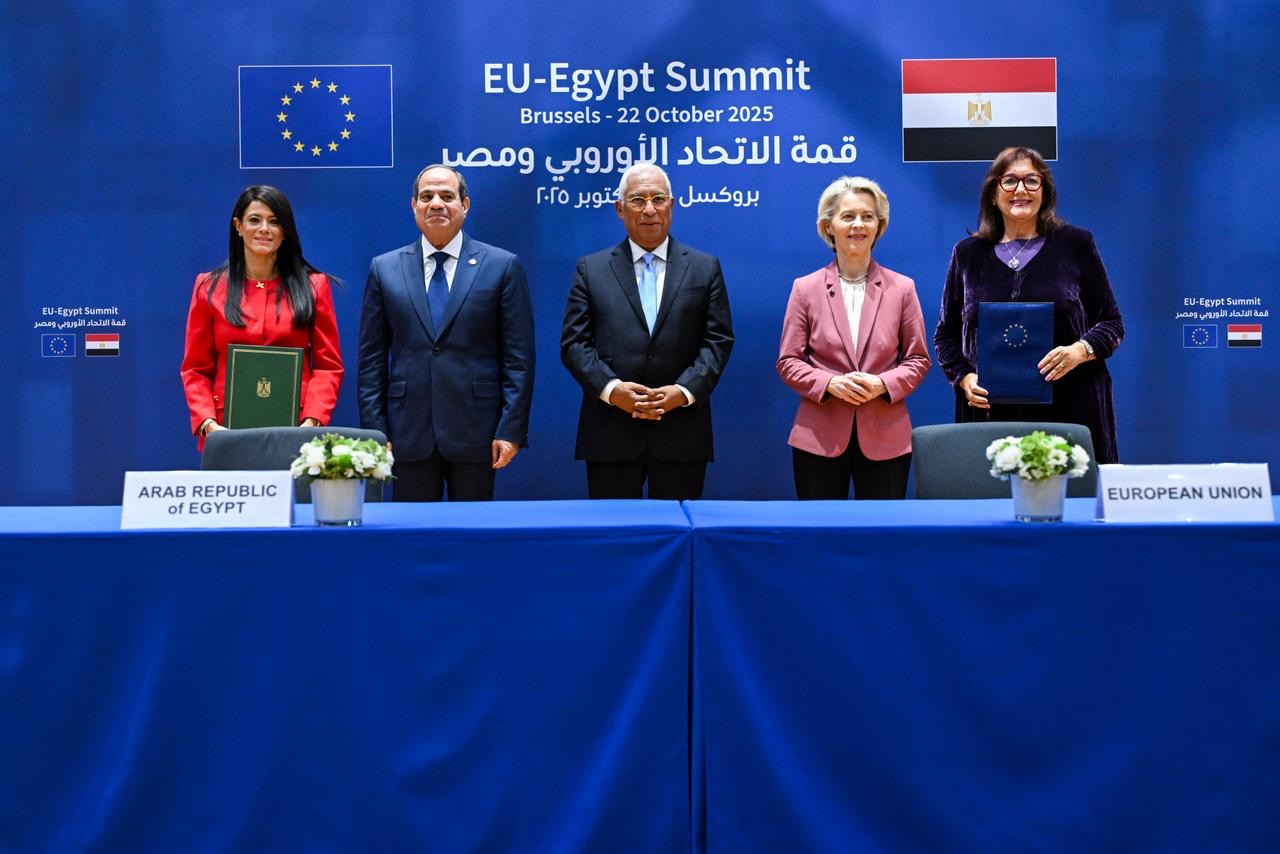Dr. Rania Al-Mashat:
The second phase of financing supports the government's efforts in implementing the National Structural Reform Program.
The financing bolsters the state's efforts to diversify funding sources, ensure the sustainability of debt, and extend its maturity periods.
More than 78 reforms to improve the investment climate, enhance economic stability, and support the green transition.
The Egyptian-European Summit affirms the robustness and strength of the joint relations and opens horizons for further cooperation.
Signing of the EU Support Program for the Implementation of Socio-Economic Reforms at the Local Level with a grant value of €75 million.
The agreement aims to implement development measures in lower-income areas and improve the quality of basic services provided to citizens.
As part of the strategic and comprehensive partnership between the Arab Republic of Egypt and the European Union, and during the events of the Egyptian-European Summit in the Belgian capital, "Brussels," Egypt and the European Union signed a Memorandum of Understanding for the second phase of the Macro-Financial Assistance (MFA) and Budget Deficit Support Mechanism, worth €4 billion.
The agreement was witnessed by H.E. President Abdel Fattah El-Sisi, President of the Arab Republic of Egypt, H.E. Mr. António Costa, President of the European Council, and H.E. Ms. Ursula von der Leyen, President of the European Commission. The agreement was signed on the Egyptian side by H.E. Dr. Rania Al-Mashat, Minister of Planning, Economic Development and International Cooperation, and on the European side by H.E. Mr. Valdis Dombrovskis, European Commissioner for the Economy and Productivity.
The Minister of Planning, Economic Development and International Cooperation pointed out that the Macro-Financial Assistance and Budget Support Mechanism (MFA) is part of a broader partnership between Egypt and the European Union based on trade and investment relations to support macroeconomic resilience.
Dr. Al-Mashat noted that the second phase, valued at €4 billion, came after continuous coordination between various national entities on one side and the European Commission on the other throughout the current year, in order to finalize the proposed structural reform matrix, which includes 87 reforms within the National Structural Reform Program.
Dr. Al-Mashat reaffirmed that these reforms aim to support macroeconomic stability and resilience, improve competitiveness and the business environment, and promote the green transition, including the protection of the Red Sea ecosystem. She highlighted that this partnership supports the state's efforts to continue the path of economic reform and enhance economic resilience in the face of external fluctuations, noting that the financing bolsters the government's efforts to extend debt maturities, enhance its sustainability, and bridge the financing gap.
On another note, Dr. Rania Al-Mashat signed a new financing agreement with Ms. Dubravka Šuica, the new European Commissioner for the Mediterranean, titled "EU Support for the Implementation of Socio-Economic Reforms at the Local Level," valued at €75 million in the form of a grant from the 2024 allocation, within the Neighborhood, Development and International Cooperation Instrument (NDICI – Global Europe) framework, with co-financing from the Federal Republic of Germany.
Dr. Al-Mashat added that the agreement aims to strengthen the strategic partnership between Egypt and the European Union through the implementation of integrated development interventions in lower-income areas. The focus is on improving the quality of basic services such as education, health, and water, promoting livelihoods, and improving healthcare, with special attention given to lower-income groups and refugees, which enhances socio-economic resilience in the face of multiple challenges.
This project is considered one of the main components for implementing the sixth pillar of the Strategic and Comprehensive Partnership between Egypt and the European Union, related to "Human Capital and Demography," and represents direct support for the Egyptian government's efforts in implementing socio-economic reforms and addressing the repercussions of regional and international crises.
The project's objectives are distributed across several main axes, including: improving access to basic services in the targeted areas and promoting sustainability and citizen participation in the planning process; expanding economic opportunities and supporting livelihoods, especially for women and youth; raising the quality of healthcare services, taking into account the needs of women and children; and linking social development with local economic services to ensure a sustainable impact on the lives of citizens.
The implementation of the program involves several national partner entities, including: the Ministry of Health and Population, the Micro, Small and Medium Enterprises Development Agency (MSMEDA), the Urban Development Fund, and the General Organization for Physical Planning, in addition to the Ministry of Planning, Economic Development and International Cooperation, which has a pivotal role in supporting comprehensive and sustainable development at the national and local levels.
It is worth noting that the Minister of Planning, Economic Development and International Cooperation announced in December 2024 the European Parliament's approval of the first phase of the Macro-Financial Assistance and Budget Support Mechanism, valued at €1 billion, which the government received in January 2025.
